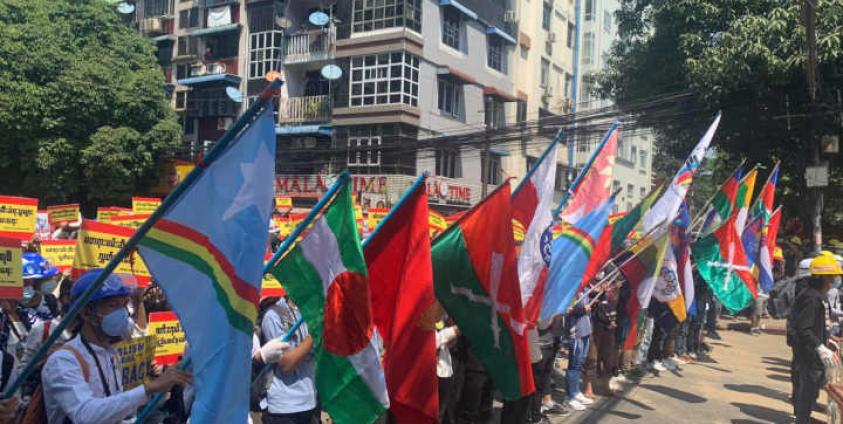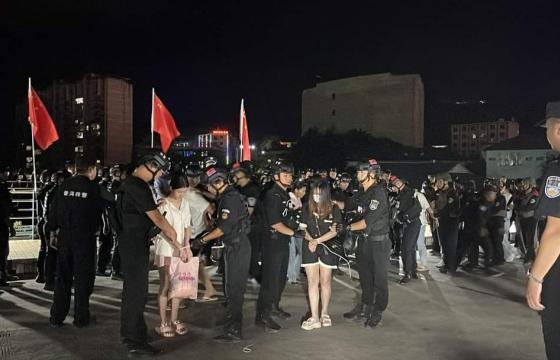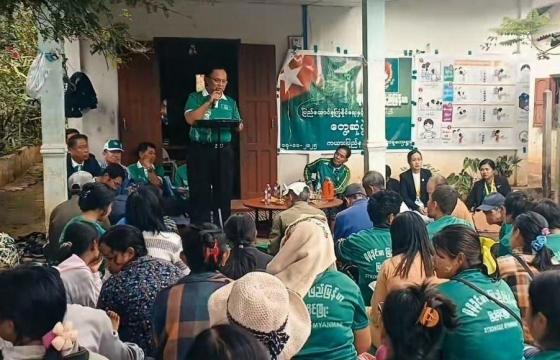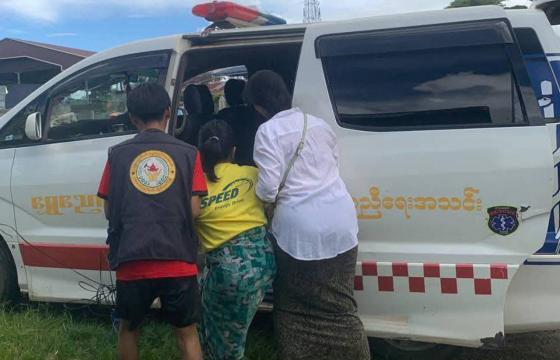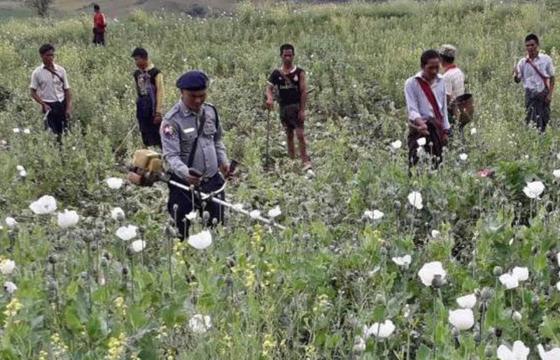Sai Wansai - During the past week and until very recently over 60 anti-coup demonstrators were killed and hundreds wounded, with over 1800 in detention, which keep on increasing daily, includes most National League for Democracy (NLD) first line leaders and MP-elects, together with individuals that the military considered to be its opponents and those vocally against the military establishment.
“As of March 7, a total of (1790) people have been arrested, charged or sentenced in relation to the attempted military coup on February 1. Of them, (3) were convicted; (2) to two years imprisonment, (1) to three months. (70) have been charged with a warrant and are evading arrest, (318) were released. A total of (1472) are still under detention or have outstanding charges/evading arrest, including the (3) sentenced,” according to the Assistance Association for Political Prisoners (AAPP).
Moreover, on diplomatic front the Committee Representing Pyidaungsu Hluttaw (CRPH) acting government formed by NLD MPs elected during the November 8 general elections have been busy lobbying the UN and international community to lend legitimacy to its parallel administration. It reinforced the already well placed UN Permanent Ambassador Kyaw Moe Tun, who responded to the call of civil disobedience movement (CDM) and endorsed the CRPH acting government, with Dr Sasa as UN special envoy and Htin Lin Aung as foreign relation representative.
Dr Sasa has called on the UNSC to employ responsibility to protect (R2P) to save Burma or Myanmar; implement arms embargo; targeted sanctions on all business enterprises connected to the military; and renounce the use of force by the military or Tatmadaw and brings perpetrators of atrocities to justice.
Furthermore, he told the media that International Criminal Court (ICC) would be proposed to issue warrants for Min Aung Hlaing and other military leaders for crime against humanity and genocidal intent in the case of Rohingya and other ethnic nationalities.
The junta on its part hired a lobby firm based in Canada which is led by an Israeli-Canadian lobbyist Ari Ben-Menashe, a former Israeli military intelligence official who previously has represented Zimbabwe’s Robert Mugabe and Sudan’s military rulers.
He said Myanmar’s generals actually wanted to be closer to the West and one of the reason hinted for the military coup was because Aung San Suu Kyi was getting nearer to China. He also said the junta wanted to repatriate Rohingya who fled to neighboring Bangladesh, most likely to suit down the dissatisfaction of the international community, which in reality was the humanitarian issue created by the military Commander-in-Chief Min Aung Hlaing as a “final solution”. He once said area clearance of the Rohingya was an unfinished job that he was carrying out.
Reportedly, the anti-coup camp strategy is based on three pillars, spearheaded by CRPH to form national unity government, which is still in the making while it has meanwhile already formed the acting government. They are anti-military public rallies countrywide; CDM to make the junta’s state apparatus impotent; and CRPH-led national unity government to lobby international community and achieve legitimacy.
So far the junta has been trying to intimidate the public by mass arrest to nightly search-and-detain tactics, randomly shooting to frighten and scare the people to stay away from protests, killing the detained in custody, employing snipers to kill the protesters, barbaric beating up of the protesters caught, and even breaking into homes, lobbing teargas into living quarters, burning and bulldozing barricades erected by the people to protect their homes and so on.
With the mass rallies, even with the killings, arrests, and intimidation are unstoppable and the CDM have been going on unabated countrywide.
Besides, local committees representing sub-national Hluttaws are being formed in a range of areas as part of ongoing measures to protect against the Myanmar military junta’s proposed administrative offices. According to the media some 300 township committees have been formed according to the CRPH call.
In addition it has designated the Tatmadaw as terrorist organization and in return Tatmadaw has announced the CRPH illegal and those supporting it will be slapped with heavy prison terms.
The generals are said to be surprised that the mass refused to be cowed like the during the last uprisings of 1988 and 2007, according to UN Special Envoy for Myanmar Christine Schraner Burgener in her virtual press conference recently.
Thus the present situation is polarized between the two major contenders for ownership of legitimacy in international arena and the competition of administrative power domestically, where the military has taken over the state apparatus and the CRPH in collaboration with the CDM sought to make the administrative machinery unworkable for the military.
To it the role of ethnic armed organizations and ethnic political parties also enter the fray, which at the moment is unclear.
As the CRPH has made public that it welcomes the ethnic armed organizations (EAOs) and ethnic political parties (EPPs) in forming the national unity government, Karen National Union (KNU) has openly backed the demonstrators in its areas and has even sheltered more than a dozen policemen who joined the CDM.
Reportedly, it’s UN Special Envoy Dr Sasa has met KNU leaders virtually and also the Chin National Front (CNF) leadership. Meeting with the RCSS is said to be on the agenda and probably other EAOs will eventually be approached.
As for the EPPs, while they welcome the overtures with its policy visions they wanted the CRPH to reject the 2008 constitution decisively and spelled out the intended federal union constitution.
Meanwhile, Chinese State Councilor and Foreign Minister Wang Yi on March 7 spelled out a three-point proposal on de-escalating tensions in Myanmar, which are to exercise restraint and opt for negotiation of difference by contenders; it supports of the Association of Southeast Asian Nations (ASEAN) and make decision through consensus upholding the principles of non-interference in internal affairs, the ASEAN way and to seek common ground; and upholding China and Myanmar friendship and cooperation, as its friendship policy toward Myanmar is for all the people of Myanmar.
Analysis
Given such development scenarios, the abrupt negotiation between the two camps seems not viable at the moment as both consider to be winning and the situation has polarized to an extent that no party may be ready to accommodate the dialogue on China’s term of non-interference in internal affairs.
This is simply because the CRPH wants to reflect the people’s desire for R2P intervention, no matter how remote that such international humanitarian intervention could happen, as could be seen by Dr Sasa appeal to make use of it to rescue the people of Burma from military crackdown.
The animosity grows with leaps and bounds as the junta started to kill, wound and arrest people en mass which make the assorted opposition camps think that the military clique will have to be uprooted once and for all, in order democracy and federalism could foster.
And adding to it, part of the EAOs seem to be responding to the national unity call and also the EPPs cautious optimism. It is only a matter of time that more will be joining, provided their call for abolition of the military drafted 2008 constitution is accepted and the federal union constitutional draft could be agreed upon after intensive negotiations.
As for the junta, it has to come to term that the people won’t accept repressive rule anymore and the best way out will be to think about an exit strategy. Otherwise, it will only become a captain on the fast sinking ship, benefiting no one.
For now there is only three scenarios that may unfold. The first is the lingering conflict that will bleed the country to dead or become a failed state like Somalia and Syria. Secondly, one side will be able to crush the other and end the conflict. And the third is to compromise the exit of military from political arena and install a federal union that is in tune with a multi-ethnic state.
The first is highly possible, while the second is impossible due to the EAOs having their own territories and their own administrations, combined with the people’s commitment to fight to the end. The most feasible one is the third option, if the junta is not prepared to bring down the country into destruction.
High time now for the junta to realize that the time is up for military dictatorship and for that matter, also all forms and systems of totalitarianism, as the people are determined to fight tooth and nail to the very end.
Photo: Myanmar CDM
Credit : GSCN Facebook Page


